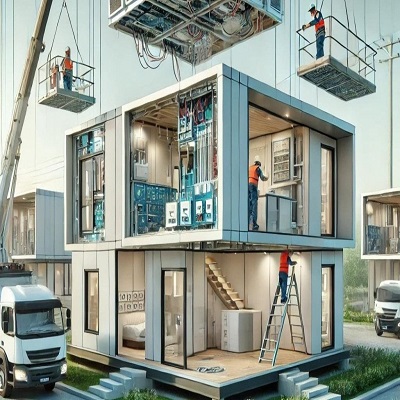Modular Construction

Modular Construction: Speed and Flexibility Combined
Introduction
Modular construction is a modern method of building where structures are constructed off-site in modules and then assembled on-site. This approach drastically reduces construction time, costs, and environmental impact while maintaining high quality and flexibility. According to McKinsey & Company, modular construction can accelerate project timelines by 20–50% and reduce costs by up to 20%.
Key Concepts
Off-site Fabrication – Modules are built in controlled factory environments, ensuring precision.
2. Standardization – Repetitive units improve speed and cost-effectiveness.
3. On-site Assembly – Transported modules are assembled quickly, minimizing labor time on-site.
4. Integration with BIM – Digital modeling optimizes planning, coordination, and logistics.
Applications
Modular construction is used in residential housing, hospitals, hotels, classrooms, military housing, and emergency shelters. In recent years, governments have increasingly used modular systems for affordable and rapid housing developments.
Advantages
Time-saving: Building and site work can proceed simultaneously.
• Cost reduction: Controlled production minimizes waste and labor costs.
• Quality: Consistent quality due to factory supervision.
• Sustainability: Less material waste and energy consumption.
Scientific Insights
Studies in the Journal of Building Engineering show that modular projects produce 30–60% less construction waste. A report by the UK government states modular housing reduces CO₂ emissions by 40% compared to traditional methods.
Challenges
Logistics: Transporting large modules requires coordination.
• Design Constraints: Less flexibility in architectural customization.
• Regulatory Barriers: Building codes in some regions may not be optimized for modular units.
Conclusion
Modular construction is revolutionizing the building industry with its efficiency and adaptability. As urban demand grows and sustainability becomes a top priority, modular approaches offer a powerful solution for the future of global construction.
References
McKinsey & Company (2019). Modular Construction: From Projects to Products.
2. Journal of Building Engineering (2022). Environmental Impact of Modular Construction.
3. UK Ministry of Housing (2020). Modern Methods of Construction Report.




